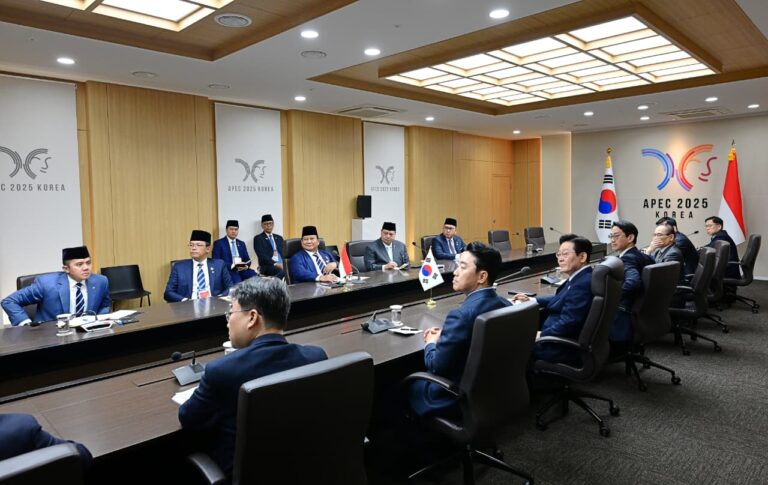Indonesia is ushering in a new chapter of economic diplomacy and industrial transformation as President Prabowo Subianto returned from the APEC 2025 Summit in Gyeongju, South Korea, carrying commitments that underscore the future of Southeast Asia’s largest economy. With billions in agreements spanning petrochemicals, electric vehicles and advanced materials, the Indonesia South Korea investment momentum is shaping what policymakers call the new backbone of Indonesia’s value added industry era.
The meeting took place in the crisp late October air of Hwabaek International Convention Centre, where geopolitical uncertainty served as the backdrop of a renewed call for confidence and unity among Asia Pacific nations. Prabowo’s message was clear: economic cooperation must be anchored in trust, inclusivity and a shared ambition to build a resilient regional supply chain.
At the heart of his mission was a strategic goal. Indonesia is moving beyond its history as a raw material exporter and positioning itself as a competitive industrial power supported by downstreaming, digitalization and clean energy. The investment breakthroughs from this summit reflect that ambition, especially in the context of fast growing Indonesia South Korea investment commitments.
Indonesia’s Downstream Push Gains New Momentum
For Indonesia, the pursuit of downstream industrialization is not an abstract plan. It is the cornerstone of national economic transformation. From nickel to petrochemicals and critical minerals, the government aims to shift from selling raw resources to becoming a producer of high value industrial goods.
During intense bilateral sessions in Gyeongju and Seoul, Indonesian officials met with leading South Korean industry champions including Lotte Chemical, EcoPro, Posco and Hyundai Motor Group. These are not short term investment players but long standing industrial giants with global influence. Their commitments reinforce the strategic importance of Indonesia South Korea investment ties in building next generation supply chains.
Minister of Investment and Downstreaming Rosan Roeslani and Coordinating Minister for Economic Affairs Airlangga Hartarto led the economic diplomacy efforts. From their perspective, APEC 2025 was not a ceremonial stage but an active deal room linking government ambitions with real industry capital.
Rosan emphasized that agreements secured are not symbolic handshakes. They reflect concrete downstream expansion, technology transfer intentions and capacity building that align directly with national priorities.
Major Investment Agreements: Petrochemicals, Batteries and Steel
Mega Petrochemical Expansion by Lotte Chemical
One of the largest focal points of the summit was the nearly USD 3.9 billion petrochemical complex in Cilegon, Banten. The New Ethylene Project, or LINE Project, is entering its final phase and will soon be inaugurated. It is projected to reduce Indonesia’s import dependency on petrochemical feedstocks, boost the manufacturing sector and generate more than 13,000 jobs across direct and indirect roles.
In a strategic financing move, South Korea offered Danantara a 35 percent minority stake. The sovereign wealth platform is currently evaluating the opportunity as part of Indonesia’s long term industrial control strategy. With this setup, Indonesia South Korea investment is evolving from transactional capital flows to structured shared ownership and industrial governance partnerships.
EcoPro Battery Investment to Strengthen EV Value Chain
EcoPro, a leading global battery material manufacturer, reinforced its commitment to expanding production in Indonesia with a USD 2 billion investment allocation. The company will increase cathode and precursor capacity to solidify Indonesia’s position in the EV supply chain. EcoPro also opened a door for Danantara to join as a shareholder, further extending national participation in future battery industries.
Posco and Krakatau Steel Deepen Collaboration
Posco reaffirmed its long term steel industry cooperation by preparing to boost production capacity to 10 million tons annually. Steel is expected to support domestic EV, renewable energy and construction ecosystems. This ensures Indonesia South Korea investment also strengthens legacy industrial pillars in line with future oriented production.
Hyundai Talks and the Prospect of a National EV
Another headline development was the meeting with Hyundai Motor Group, where discussions centered around Indonesia’s ambition to develop a national electric vehicle platform. Hyundai expressed readiness to deepen its role in Indonesia’s domestic EV development, including potential investment in hydrogen vehicle technology. While commercial models and engineering discussions will continue, the signal was clear: industrial partnerships will increasingly favor long term innovation, talent development and high technology adoption.
Hyundai is not only a manufacturer but a technology leader. Cooperation like this is essential, as Indonesia prepares to develop engineering talent and future supply chains that match global standards.
Trade Negotiations and Mineral Collaboration
Beyond industry deals, the summit also opened pathways for tariff cooperation and minerals trade advancement. Indonesia is preparing deeper tariff negotiations with the United States, focused on commodities not produced domestically in the US such as palm oil, rubber and cocoa.
Meanwhile, Indonesia proposed new platforms for collaboration in critical minerals, including rare earth elements. The aim is to form global industrial communities that ensure mutual benefit, security of supply and technological synergy. With mineral governance increasingly viewed through strategic, economic and geopolitical lenses, aligning portfolios through Indonesia South Korea investment and similar partnerships is vital for national resilience.
Diplomacy as an Economic Strategy
Throughout the summit, President Prabowo emphasized peace, stability and inclusive growth as the foundation of prosperous markets. His diplomacy style blends strategic clarity with partnership building. Indonesia is positioning itself as a confident leader with sovereign strategy, yet cooperative in the regional development agenda.
From petrochemical plants to EV supply chains, the agreements inked in Gyeongju represent more than foreign direct investment. They embody Indonesia’s evolution into a future ready industrial nation supported by domestic capability expansion and global partnerships.
The Indonesia South Korea investment wave marks only the beginning of a broader industrial journey. As new factories begin operating, talent pipelines strengthen, and supply chain networks expand, Indonesia’s economy is stepping into a new era of self determination and manufacturing excellence.
Read More






 Monday, 09-02-26
Monday, 09-02-26







